
Anton de Kom-square in Amsterdam-Zuidoost
4 May 2004
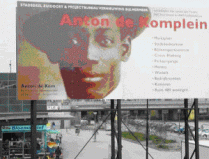
On saturday 24 April 2004 the go-ahead was given for executing all plans at and around the new Anton de Kom-square in Amsterdam-Zuidoost (picture: www.zuidoost.amsterdam.nl)
Anton de Kom
On April 24 it was exactly 59 years ago Surinam Anton de Kom died in a German concentration camp. Parts of the Surinam and Dutch history come together in the life of Anton de Kom. His resistance against poverty and oppression is meaningful to all inhabitants of Zuidoost. Anton de Kom meant a lot to the awakening of Surinames, of their situation in the thirties and their colonial past. He was a nuisance to the Dutch authorities in Surinam and was, in 1933, with no form of process put on a boat to Holland. During World War II he got involved in underground activities. In August 1944 he's run in and eventually ends up in a German concentration camp. Just before the liberation, in April 1945, he succumbes to the hardships.
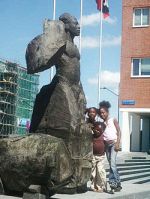
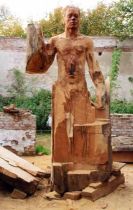
Bronze statue A. de Kom Wooden study statue A. de Kom
(picture: Pieter Delicaat, www.wikipedia.org) (picture: www.zuidoost.amsterdam.nl)
Monument
61 Years after his death, on 24 April 2006, a bronze statue of De Kom was reveiled at the Anton de Kom-square. The final design by Dutch artist Jikke van Loon was chosen by the town district from the work of four sculptors. Only a few Surinam Dutch tried to prevent the unveiling, as the believed it to be too naked and too stereotype of how Dutch people perceive Surinam people. Proponents believed the statue to be in the tradition of African sculptures of forfathers. These are always totally naked. The Antillian filmdirector Felix de Rooy said about the subject: "He had a Dutch wife and his children are a mix of Suriname and The Netherlands. Black nationalism is out of place here, as Anton de Kom was for all people." (http://surinaams.caribiana.nl/Cultuur/car20060425_beelddekom.html). A copy of the statue was shown during the exposition 'Helden' ('Heroes') in the Nieuwe Kerk in Amsterdam (summer 2007).
The life of Anton de Kom
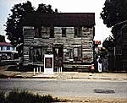
House of birth
Cornelis Gerhard Anton de Kom is born on 22 February 1898 in Paramaribo. His father Adolf Damon De Kom was still born in slavery. His mother, Judith Jacoba Dulder, descended from slaves bought free. Father De Kom worked as a farmer and golddigger. The family consisted of six children, 3 boys and 3 girls.
Anton de Kom goes to the Paulus secondary school, which was something special, because in that time it was the highest form of education in Surinam.
De Kom starts his work at bailiff Ansom at the H.C. Cooke office. After two months he resigns because of his poor earnings - only 7.50 guilders a month.
De Kom starts working at the Balata-compagnie. It is here he comes into contact with the heavy work and bad working conditions of the balata bleeders (rubber tappers).
De Kom resigns again. On August 1 he leaves as a working passenger on a ship to Haiti, where he finds a job at the Societé Commerciale Hollandaise Transatlantique.
He travels on to Holland where, after a short stay in Rotterdam and Amsterdam, in Januari 1921 joins the Hussars as a volunteer.
De Kom joins the Hanze Consultancy in The Hague where in 1923 he receives an honourable dismissal because of 'Reorganisation from the Bureau'.
De Kom joins the coffee-, tea- and tobacco trade Reuser and Smulders, also in The Hagues. There he meets his future wife, Petronella Catharina Borsboom, who is an office servant.
De Kom marries Petronella Borsboom. From this marriage 3 boys and a girl are born.
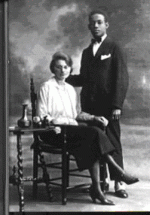
Anton de Kom and his Dutch wife
During this period his political views receive an important impulse by his contacts with the nationalistic movement of the students of the Netherlands Indies in Holland, the Perhimpoenan Indonesia, under the leadership of a.o. Hatta. In 1926 against this organization charges are filed consisting a manifest, also supported by De Kom, against Dutch colonialism.
He comes in contact with the Internationale Roode Hulp (International Red Help), the Internationale Arbeiders Hulp (Internatinal Workers Help), and the Liga against Imperialism en for Colonial Independance. He joins the workmens and writers collective Links Richten (Aim Left). He writes articles for a.o. the Communist Guide gives lectures on the situation in Surinam.
De Kom tries to return to the West. In vain he applies for a job at the Bataafsche Petroleum Maatschappij (oil company) on Curaçao.
De Kom approaches gouverner Rutgers, being on leave in Holland, with a request to being permitted, together with a few other people and on gouvernement expenses, to go to Surinam and start small scale farming.
Due to family circomstances De Kom returns to Surinam. With him he takes his entire family and also his furniture in order to settle down in Surinam.
De Kom arrives in Surinam. The Minister of Colonies sends the gouverners of Surinam and Curaçao a telex and calls him 'a communist agitator for the Anti-colonial Liga and the 'Internationale Rode Hulp'. From the moment of arrival De Kom is being shadowed by three special agents. In Surinam De Kom is struck by the miserable social conditions: 'the emaciated faces, the appalling housing conditions, the bad health system, the cruelty by the whites, the unfair regulations by the rulers, the starvation wages from the working class, the striking injustice, and the hostility by the oppressors'. Various attempts by De Kom to call meetings, aren't allowed to take place by the gouvernment.
De Kom decides to establish a consultancy firm. He listenes to the peoples complaints and stimulates them to organization and solidarity. In the political area he suggests major gouvernemental reforms. "Only when the peoples themselves can participate in gouverning the colony, only then they will be able to end that situation, in which the small farmer is the dayly slave of the direst need". It are these views that make De Kom a danger in the eye of the Colonial Gouvernment.
De Kom wants to have a public meeting on his fathers yard. When the meeting is prohibited De Kom, joined by a thousand people, heads for gouverner. The crowd is scattered and De Kom arrested.
On 7 February thousands head for the attorny-general to demand his release. Unexpectedly the police start firing into the crowd. Two persons are killed and 23 are injured.
De Kom is banned to The Nederlands. After his return to Holland he gives various lectures about the situation in Surinam. He also continues his work on the book 'Wij slaven van Suriname' (We, slaves of Suriname) and becomes co-editor of 'Links Richten'. Because of the great unemployment in Holland, he isn't able to find a job and ends up being on the dole.
The first, censured, issue of 'Wij slaven van Suriname' is published. It's the first time a book registers the Surinam history by the view from the oppressed population. It is an accusation against the colonial regime and also against the appalling conditions the descendants from the slaves live in. For a long time the book is prohibited in Surinam.
De Kom tries everything to get a job.
As a tapdancer he travels with a group abroad. He also joins in on unemployment actions and gets involved in the resistance against fascism.
De Kom suffers a nervous breakdown and stays for 3 months in an institute. Just before the break of war he's being placed in the unemployed relief work and has to shovel snow.
During the war he gives private lessons in English and book-keeping.
De Kom contributes to the resistance paper 'De Vonk'.
De Kom is arrested by the Germans and as a political prisoner being detained in the Oranje Hotel in Scheveningen. Within the same month he's transported to Vught.
De Kom is on transport again, this time to Oranienburg-Sachsenhausen, where he's put to work at the Heinkel factories.
At last De Kom ends up in Sandbostel where he dies from tuberculoses in 1945.
His remains are found in a mass-grave in Sandbostel and transported to Holland, where they are buried at the Cemetary Loenen.
'Wij slaven van Suriname' is published in an uncensored second print. The book is striking in its resemblance to current affairs. In the 37 years after its first publication not a lot had changed.
The information on Anton de Kom is based on interviews with the daughter and oldest son, Judith and Ad de Kom; a second source is the foreword from 'Wij slaven van Suriname', and the third source is the study from historian Ben Scholtens: 'Opkomende arbeidersbeweging in Suriname' ('The rise of the workingclass movement in Suriname').
Book 'Wij slaven van Suriname'
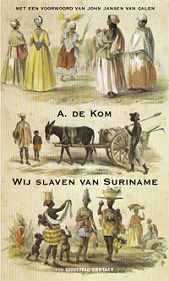
Fitting in with the theme month Surinam from the RVU Broadcast - and especially with the documentiairy about Anton de Kom - a reprint was published of 'Wij slaven van Suriname' ('We slaves of Suriname').
The book was first published in 1934 and was an accusation against the history of slavery and against the conditions the descendants of the slaves, Hindoestanes and Javanese in the colonial Surinam had to live in: high child death rates, malnutrition, unemployment, slums, bad health care.
Even with all its sadness, the book brought a positive, optimistic message and De Kom succeeded to bring the various populations together in their struggle for a human life. Surinames and others still can derive hope and inspiration from this unique document. It turns out to be an indispensible book when assessing todays developments in Surinam. Journalist and Surinam-authority John Jansen van Galen wrote an extensive forword, placing De Kom's texts in a present-day perspective.
More reading / Sources

Anton de Kom. Biography 1898-1945/1945-2009. Alice Boots and Rob Woortman. Amsterdam 2009.
'Opkomende arbeidersbeweging in Suriname' - Ben Scholten
'Wij slaven van Suriname' - RVU
www.omroep.nl/rvu/rvu_web/suriname
www.suriname.nu
www.zuidoost.amsterdam.nl
